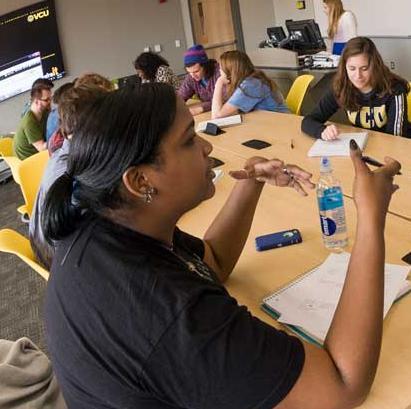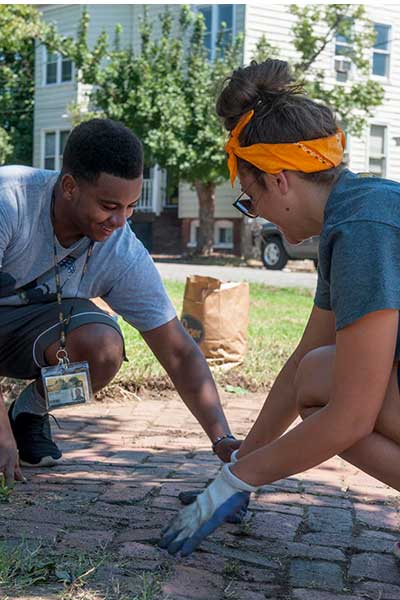REAL-world experience matters.
When the classroom becomes the conference room, good things happen! Our students gain hands-on experiential, applied and service learning coursework in many of our undergraduate classes. Here, clients, community collaborations and outfacing projects become the assignment. Student work is enriched by elevated standards that are intended for use by an external organization. Many of these projects, collaborations and partnerships have lead to REAL change in our community. All of that experience adds tremendously to a students resume and portfolio while creating a good story to tell at the interview table.
What is VCU REAL?
Experiential learning has many different definitions, but at its core involves an integration of disciplinary knowledge and intellectual skills with “real-world” experiences. Experiential education occurs along a continuum that prepares students to take increasingly autonomous and empowered roles in their own educational processes.
REAL experiences are defined as student engagement in transformative, career building activities that connect classroom knowledge to real-world experience, create novel approaches to complex problems, and contribute actions that benefit our educational, professional, and civil communities. All REAL experiences are classified by a Level and Type.
The following terms are used to define and classify VCU curricular and co-curricular types of experiential learning activities.


What is service-learning?
At VCU, service learning refers to an intentional teaching strategy that engages students in organized service activities and guided reflection. The service activities benefit the community and, in combination with reflection and other classroom-based learning activities, enhance the academic curriculum of participating students.
Service-learning designation is reserved for those credit-bearing academic experiences that involve each enrolled student in a minimum of 20 hours of service per semester, as well as in planned reflection activities.


Designated Courses
The following Robertson School courses have received service-learning designation.
MASC 251. Global Health and Social Media. 3 Hours.
Semester course; 3 lecture hours. 3 credits. An online service-learning class in which students explore the theory and practice of social media campaigns for global health issues and develop projects for nonprofit clients. The class will explore the following issues: theories and concepts of social media campaigns about global health issues; practical application of social media in health campaigns; targeting online audiences through social media; utilization of multimedia content for social media; and organizational strategies for social media to achieve social benefits.
The VCU Bulletin is the official source for academic course and program information.
MASC 291. Topics in Communications. 1-3 Hours.
Semester course; variable hours. 1-3 credits. May be repeated once with different content. A study of a specialized topic in mass communications. See the Schedule of Classes for specific topics to be offered.
The VCU Bulletin is the official source for academic course and program information.
MASC 334. Visual Communication and Design for Public Relations. 3 Hours.
Semester course; 2 lecture and 2 laboratory hours (delivered online, face-to-face or hybrid). 3 credits. Prerequisites: MASC 203 and MASC 210, each with a minimum grade of C. Enrollment is restricted to public relations students or media studies minors. Provides hands-on experience with current graphic design software such as Adobe Illustrator, Photoshop and InDesign while building skills for concepting, developing and critiquing design projects for public relations. Explores theoretical and practical approaches to visual communication and message development. Exposes students to the language skills and empathy required to work with professional designers in the industry. Establishes a diverse portfolio of graphic design materials. (May not be taken if student has completed MASC 300 or MASC 301.).
The VCU Bulletin is the official source for academic course and program information.
MASC 335. Multimedia Production. 3 Hours.
Semester course; 2 lecture and 2 laboratory hours (delivered online, face-to-face or hybrid). 3 credits. Prerequisite: MASC 300 with a minimum grade of C. Multimedia technology course used to advance the digital and practical skills developed in prerequisite course. Explores current and innovative approaches to multimedia tools and technology used for communication professionals including, but not limited to, multimedia photography, audio and video storytelling, desktop publishing and website design. Explores industry trends in digital, online and mobile communication. Establishes a diverse portfolio of multimedia projects.
The VCU Bulletin is the official source for academic course and program information.
MASC 425. Public Relations Research Methods. 3 Hours.
Semester course; 3 lecture hours (delivered online, face-to-face or hybrid). 3 credits. Prerequisites:STAT 208 or STAT 210; MASC 333 and MASC 337, each with a minimum grade of C. Enrollment is restricted to public relations students. An introduction to the role of research in public relations, with primary emphasis on content analysis, focus group, survey and communication audit methods, and the evaluation of quantitative research data.
The VCU Bulletin is the official source for academic course and program information.
MASC 439. Agency. 3 Hours.
Semester course; 3 lecture hours (delivered online or face-to-face). 3 credits. Prerequisites: MASC 274, MASC 333, MASC 336, MASC 337 and MASC 425, each with a minimum grade of C. Enrollment is restricted to public relations students. Fast-paced, professionally driven course where students take the lead to fulfill the public relations needs of clients in the community. Working from the first class through the end of the semester, students apply theoretical and practical skillsets learned in the program to perform research, strategic plan development, tactical design and execution. Assesses students' theoretical and practical learning achieved in the program as a capstone course concluding with a final presentation for critical feedback by the client(s) and other industry professionals.
The VCU Bulletin is the official source for academic course and program information.
MASC 450. Style. 3 Hours.
Semester course; 3 lecture hours (delivered online, face-to-face or hybrid). 3 credits. Prerequisites: MASC 392 and MASC 394, both with a minimum grade of C. Enrollment is restricted to mass communications majors. An advanced, intensive study of advertising style, forming one's own sense of style and the creative process. Emphasizing strategic and creative development of advertising campaigns. Students will conceptualize advertising campaigns, execute digitally produced, comprehensive advertisements and campaign materials, and assemble a final portfolio. Culminates in a formal portfolio review with professionals from the advertising industry.
The VCU Bulletin is the official source for academic course and program information.
MASC 467. CreateAthon at VCU. 3 Hours.
Semester course; 3 lecture hours. 3 credits. Prerequisites: for advertising students: MASC 392 and 394 each with a minimum grade of C, or MASC 398 and 399 each with a minimum grade of C, or approval by instructor; for public relations students: MASC 333, MASC 335 or MASC 337 with a minimum grade of C. Enrollment is restricted to mass communications majors. Students will be selected to work with area nonprofit clients to create and produce a wide variety of advertising and promotional materials. Students develop strategy, write creative briefs, recruit teams to work with them during CreateAthon at VCU (a marathon creative event held during the semester), present work to clients and follow deliverables through production. Strong emphasis on leadership and commitment to working with nonprofits.
The VCU Bulletin is the official source for academic course and program information.
MASC 475. Capital News Service. 6 Hours.
Semester course; 2 lecture and 8 laboratory hours. 6 credits. Prerequisites: MASC 274 and MASC 303, both with a minimum grade of C. Enrollment is restricted to mass communications majors. Advanced journalism students report on complex issues facing the public. Emphasis on covering state government and politics, including the Virginia General Assembly, the governor, regulatory agencies and elections. Students are expected to create timely, proficient news content that could be published through the Capital News Service newswire and the Robertson Newsroom’s other distribution channels. Strong emphasis on fast-paced deadlines.
The VCU Bulletin is the official source for academic course and program information.